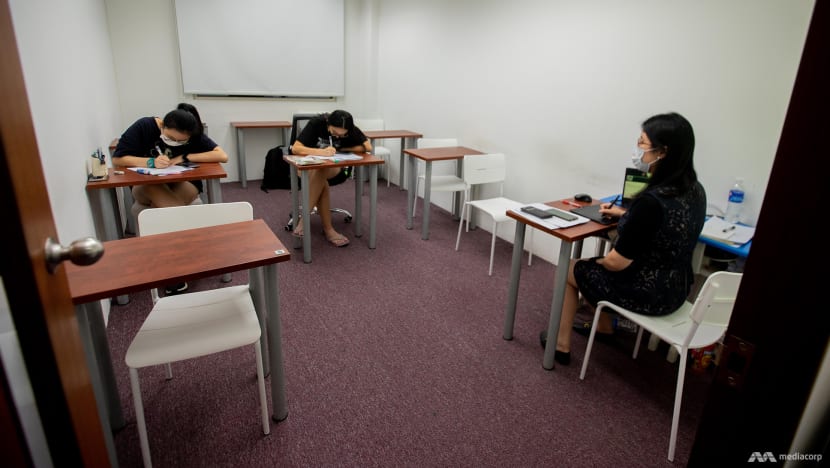MOE working with advertising industry on code of conduct to rein in 'black sheep' of tuition industry
Education Minister Chan Chun Sing criticised tuition centres that engage in unethical practices by exploiting parents’ anxieties and fear of missing out.


This audio is generated by an AI tool.
SINGAPORE: The Ministry of Education (MOE) is working with the advertising industry to establish a code of conduct to rein in marketing that guilt trips parents and creates a fear of missing out, said Minister for Education Chan Chun Sing.
In an interview with CNA looking back at educational policies during the current term of government, Mr Chan had strong words for some tuition centres – what he called the “black sheep” of the industry – for using fear-based advertising tactics.
“Those people who tout their services, they guilt trip the parents to think: ‘So many people are doing this, why are you not?’” he said, likening the situation to the marketing practices of formula milk manufacturers in previous years.
In 2023, the government formed a task force to address rising formula milk prices after a consumer watchdog found that manufacturers spent heavily on research and marketing to position their products as premium and build brand loyalty.
Mr Chan emphasised that parents should feel confident in their own decisions about their children and not be subject to these pressures.
He cited a recent incident - which was also raised recently in parliament by Bukit Panjang Member of Parliament Liang Eng Hwa - where staff from a tuition centre distributed flyers outside a primary school on the first day of school.
“My principal went out and gave them a piece of our minds. It was totally unnecessary,” he said, stressing that Primary 1 students do not have exams. “Instead of inculcating the joy of learning, we are handing out flyers to parents to create this fear of missing out.”
Minister of State for Education Gan Siow Huang said in parliament earlier in February that the Education Ministry was studying how to discourage tuition centres from using undesirable advertising practices.
The Advertising Standards Authority of Singapore's chairman Bryan Tan confirmed that the authority met with MOE to discuss advertising self-regulation and considerations behind potential sector-specific guidelines.
Beyond aggressive marketing, Mr Chan also criticised tuition centres that selectively admit students to boost their success rates and claim credit for their academic achievements.
“It’s most unethical and it does a disservice to the whole image of a teacher.”
Some tuition centres go as far as to offer discounts to students or parents who advertise their services. Others enlist top Primary School Leaving Examination (PSLE) performers to endorse their brands.
“All these are unnecessary, and it just adds to the guilt-tripping of the parents,” he said.
“(They) say: ‘If you consume this product, you will get top PSLE scores.’ Sorry, it's the other way around. They got the top PSLE scores, and you asked them to endorse your product.”
A code of conduct, which MOE is discussing with the advertising industry, would provide guidelines for tuition centre marketing, said Mr Chan.
When speaking to students about tuition, the minister said he usually asks whether they attend tuition voluntarily or under parental pressure, which is “a very fundamental difference”.
He has no issue with students who want to go for extra classes and learn more, he said.
“But I'm always worried for the students who look very grouchy and down when they go for such lessons, because they seem to be trying to fulfil someone else's expectations rather than their own aspirations.”















